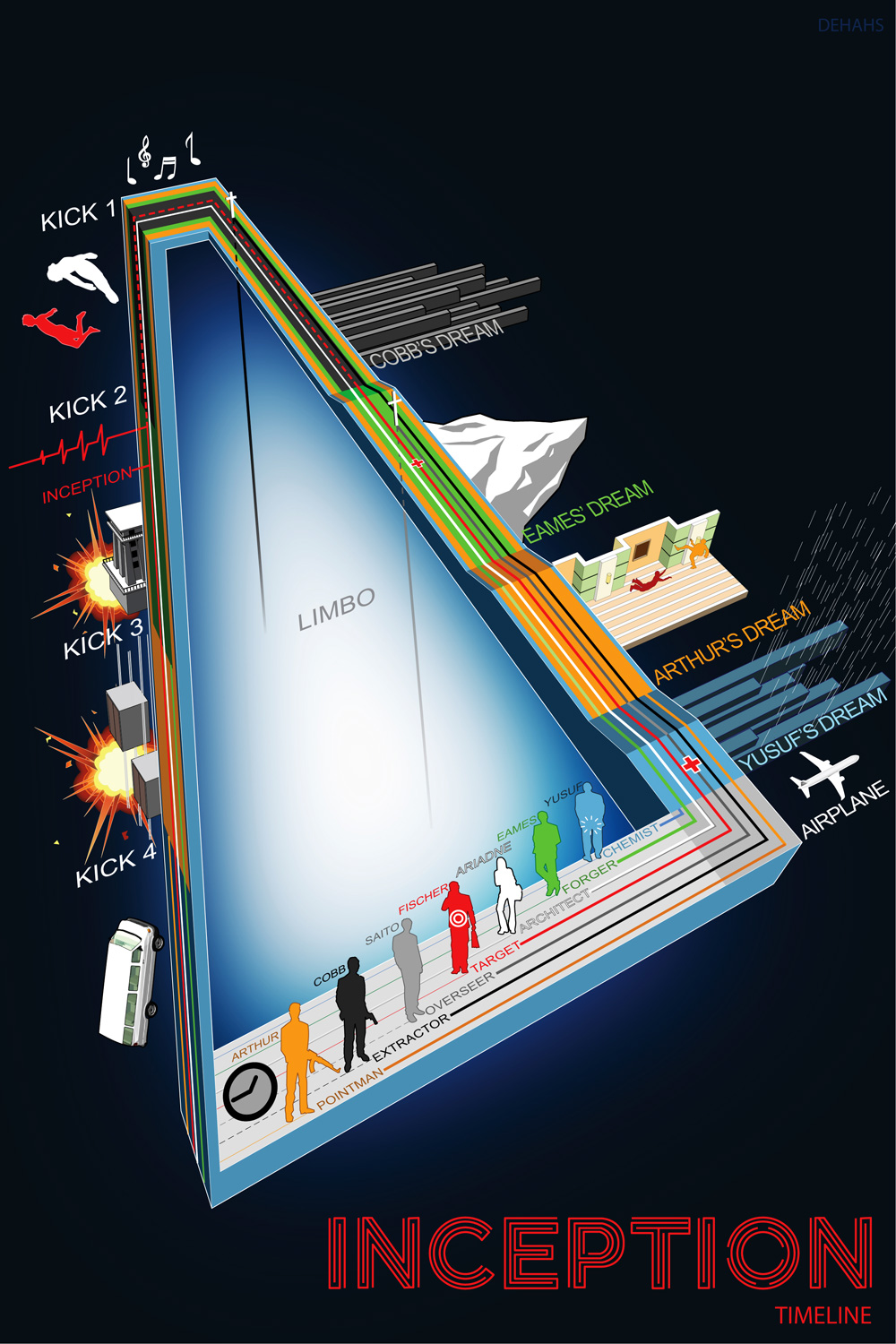fridge, v. to kill off a female character solely for the purpose of giving the story's main male hero a reason to angst. Coined by Gail Simone in response to a storyline in The Green Lantern in which the hero's girlfriend is killed and literally stuffed in his refrigerator. In 1999, Simone started a website, Women in Refrigerators, that lists all of the comic book women who have been fridged.
Unless you've been living under a rock lately, you've heard of director Christopher Nolan's new movie Inception. It's a long-generating story, one that he's been working on for over a decade, biding his time and building up enough of a reputation in Hollywood that he could get the backing for his dazzling mindfuck of a pet project.
And build up a reputation he has: Nolan has had a string of hits, both financially and critically. On the review-aggregating site Rotten Tomatoes, not one of his films rates below a 75%. His last movie, The Dark Knight, grossed over 1 billion dollars worldwide. There are precious few filmmakers in Hollywood who have so successfully balanced artistic achievements with the culture of spectacle, not so much infusing blockbusters with a decent story as crafting intricate scripts that just so happen to have blockbuster potential.
It's a goddamn shame, then, that he feels the need to fridge the hell out of his women.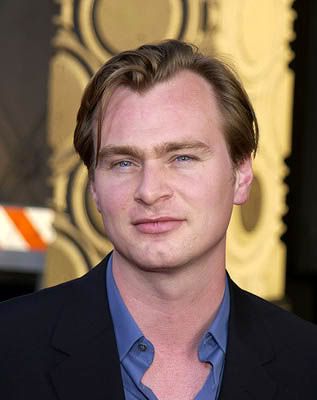
In case you haven't figured it out by now, THIS POST CONTAINS MAJOR SPOILERS FOR ALMOST EVERY CHRISTOPHER NOLAN MOVIE EVER MADE. Also, I am not a scientist or a professional researcher.
Don't get me wrong: I love Christopher Nolan's movies. Memento is one of my favorites. I own The Dark Knight. Next week I will see Inception for the third time in theaters. But there's always a lingering icky feeling after the credits roll, when I watch the actors' names rise from the bottom of the screen and try to remember whether any of the women listed did anything important other than die. More often than not, the answer is a resounding no. And when they do live, they're usually evil.
Don't believe me? Let's have a look.
CASE STUDY: Memento (2000)
The movie that made us all sit up and go, "Christopher WHO?" A crackerjack film noir told in reverse about an amnesiac named Leonard (Guy Pearce) who's looking for the man who killed his wife...or is he?
The women: Natalie (Carrie-Ann Moss). A bartender who Leonard meets on his search through the underbelly. By turns helpful and treacherous, Natalie ultimately manipulates Leonard for her own purposes, using his disability to kill off or maim those who are threatening her. She's undeniably shady, but just how bad she is depends on your interpretation of the movie's events. Alive, antagonist.
Natalie (Carrie-Ann Moss). A bartender who Leonard meets on his search through the underbelly. By turns helpful and treacherous, Natalie ultimately manipulates Leonard for her own purposes, using his disability to kill off or maim those who are threatening her. She's undeniably shady, but just how bad she is depends on your interpretation of the movie's events. Alive, antagonist.
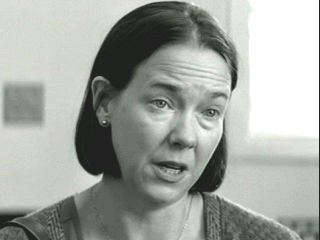 Mrs. Jankis (Harriet Sansom Harris). Apparently she has no first name. Leonard repeats the story of the Jankis' several times: Sammy Jankis has the same brain damage as Leonard, but his wife doubts whether or not he's faking it, so she decides to test him. She asks him to give her an insulin shot, then another one in a few minutes after his memory has erased the first. Surprise, surprise, he wasn't faking, and she dies. This is the first instance of a wife dying due to her husband's actions. Dead.
Mrs. Jankis (Harriet Sansom Harris). Apparently she has no first name. Leonard repeats the story of the Jankis' several times: Sammy Jankis has the same brain damage as Leonard, but his wife doubts whether or not he's faking it, so she decides to test him. She asks him to give her an insulin shot, then another one in a few minutes after his memory has erased the first. Surprise, surprise, he wasn't faking, and she dies. This is the first instance of a wife dying due to her husband's actions. Dead.
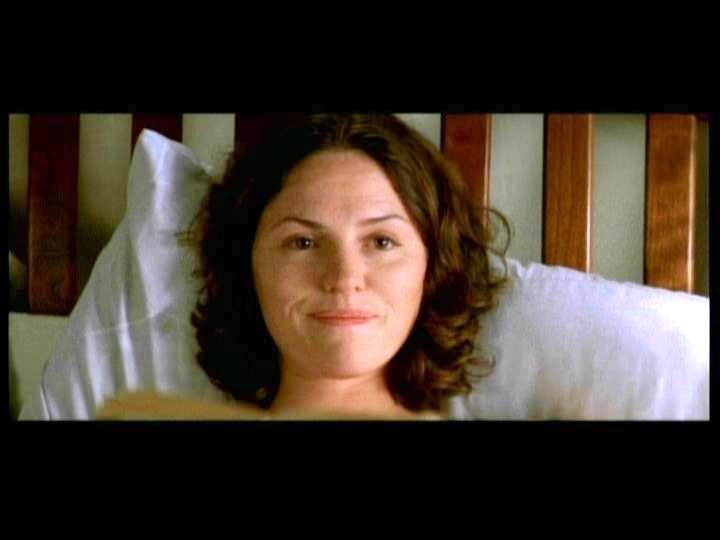 Leonard's Wife (Jorja Fox). No, seriously, Leonard's Wife is her official credit. She didn't get a fucking name either. Oy. Anyway, she actually sort of dies twice in the movie, once when she and Leonard are first attacked; she survives the attack, but Leonard doesn't remember that, and the loss drives him through most of the film. It's revealed at the end, though, that she was actually the one with the insulin, and Leonard invented Sammy Jankis and his wife in order not to deal with the guilt. So really we get two dead-because-of-her-husband-wives for the price of one. Dead.
Leonard's Wife (Jorja Fox). No, seriously, Leonard's Wife is her official credit. She didn't get a fucking name either. Oy. Anyway, she actually sort of dies twice in the movie, once when she and Leonard are first attacked; she survives the attack, but Leonard doesn't remember that, and the loss drives him through most of the film. It's revealed at the end, though, that she was actually the one with the insulin, and Leonard invented Sammy Jankis and his wife in order not to deal with the guilt. So really we get two dead-because-of-her-husband-wives for the price of one. Dead.CONCLUSIONS: Two dead, unnamed wives inadvertantly killed by their husbands' conditions; one femme fatale. We're off to a bangup start. Movie also fails the Bechdel Test: at no point in the movie do two women even speak to each other.
The Bechdel Test: a litmus test developed by writer Alison Bechdel in 1985 to gauge the agency and autonomy of a story's characters. The test has three parts: 1) Are there two female characters who 2) talk to each other 3) about something other than a man?
CASE STUDY: Insomnia (2002)
Detective Frank Dormer (Al Pacino) hunts for serial killer Walter Finch (Robin Williams) in Alaska with the assistance of a local cop named Ellie Burr (Hilary Swank). After he accidentally shoots his partner and covers it up, though, he and the killer wind up morally entangled, and Ellie gets suspicious.
The women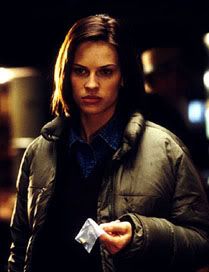 Ellie Burr (Hilary Swank). Here's a good one: Burr practically salivates over Dormer at the film's outset, telling him that he's her idol, but she's also the only one sharp enough to catch the mistakes that Dormer made in his cover-up. Despite getting no backup from the rest of the local cops, who call her "Nancy Drew," she solves the mystery on her own and is the only one left standing as the credits roll. Technically she's an antagonist for the main character, but she's a principled one with plenty of agency. Alive, antagonist.
Ellie Burr (Hilary Swank). Here's a good one: Burr practically salivates over Dormer at the film's outset, telling him that he's her idol, but she's also the only one sharp enough to catch the mistakes that Dormer made in his cover-up. Despite getting no backup from the rest of the local cops, who call her "Nancy Drew," she solves the mystery on her own and is the only one left standing as the credits roll. Technically she's an antagonist for the main character, but she's a principled one with plenty of agency. Alive, antagonist.
Kay Connell (Crystal Lowe). Every serial killer story needs a naked, beaten female victim, and teenaged Kay Connell fits the bill. She's already dead before the opening credits, so we only glimpse her in flashbacks and as a bloated corpse on a morgue slab. (I couldn't find any pictures of her that weren't naked and mutilated, so I didn't put one up.) Dead.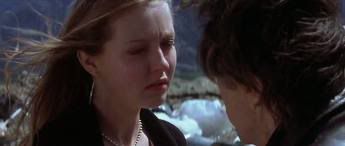 Tanya (Katherine Isabelle). Kay's "best friend," who was sleeping with Kay's boyfriend. Portrayed as a callow Lolita who comes onto Dormer and doesn't really care about her dead friend. Alive, but a Whore.
Tanya (Katherine Isabelle). Kay's "best friend," who was sleeping with Kay's boyfriend. Portrayed as a callow Lolita who comes onto Dormer and doesn't really care about her dead friend. Alive, but a Whore.
Madonna-Whore complex: a psychological condition in which men divide women into ultra-"pure" Madonnas who can never be sullied with sexual intimacy, and dirty, dirty Whores who can never possibly be wives or mothers. As in men's minds, so in culture. For example: every single Taylor Swift video, ever.
 The hotel manager (Maura Tierney). According to IMDB, she's "Rachel Clements," but I don't recall her ever being called by her name in the film. She's shown to be hard-working and professional, but is also deeply compassionate. When the sleepless Dormer is coming unglued, she listens to his desperate confession and advises him. This is the first instance of another motif in Nolan's films: women acting as the conscience of men. Which, hey, it's still using a woman as a secondary prop to a man's emotional arc, but at least she isn't evil. Alive, good.
The hotel manager (Maura Tierney). According to IMDB, she's "Rachel Clements," but I don't recall her ever being called by her name in the film. She's shown to be hard-working and professional, but is also deeply compassionate. When the sleepless Dormer is coming unglued, she listens to his desperate confession and advises him. This is the first instance of another motif in Nolan's films: women acting as the conscience of men. Which, hey, it's still using a woman as a secondary prop to a man's emotional arc, but at least she isn't evil. Alive, good.
CONCLUSIONS: Not so bad. We have two strong, principled, professional women, though one of them is technically an antagonist. We've also got a dead, mutilated teenager and a Whore, but...it kinda balances out? No on the Bechdel Test: no two women speak to each other through the whole movie.
CASE STUDY: Batman Begins (2005)
Taking over the Batman franchise, Nolan took him back to his roots for an origin story, detailing how Bruce Wayne trained himself into a crime-busting machine.
The women woman Rachel Dawes (Katie Holmes). As the one woman in Batman Begins, Rachel is brave and smart. As the only ADA with the figurative nads to stand up to the crime syndicate, she's an invaluable ally to Batman and Jim Gordon. She's also another "conscience woman," directing Bruce away from vengeance after his parents are gunned down. (Which, by the way, isn't it funny how much Bruce flashes back to his dead father? While never seeming to give a thought to his dead mother? Yes, I thought that was funny, too.) Rachel does need to be saved an awful lot. Alive, good.
Rachel Dawes (Katie Holmes). As the one woman in Batman Begins, Rachel is brave and smart. As the only ADA with the figurative nads to stand up to the crime syndicate, she's an invaluable ally to Batman and Jim Gordon. She's also another "conscience woman," directing Bruce away from vengeance after his parents are gunned down. (Which, by the way, isn't it funny how much Bruce flashes back to his dead father? While never seeming to give a thought to his dead mother? Yes, I thought that was funny, too.) Rachel does need to be saved an awful lot. Alive, good.
CONCLUSIONS: No chance at the Bechdel test, but Rachel is still a fairly good female character...
CASE STUDY: The Dark Knight
Nolan's second entry in his revival of the Batman movies.
The women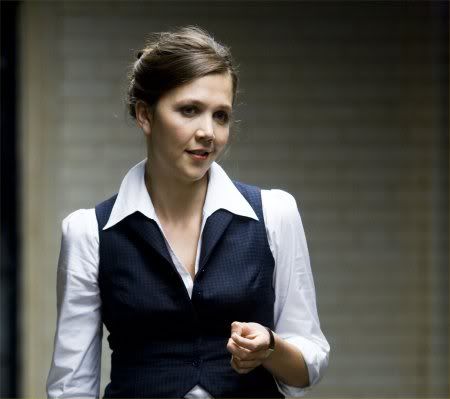 Rachel Dawes (Maggie Gyllenhaal): ...d'oh! Now, obviously the Batman franchise is based on pre-existing material, so Nolan can't 100% be blamed for this one. But still, every comic book director picks and chooses which canon to use from the books, and this is what Nolan chose. (God help us if he ever tries his hand at Catwoman.) ETA: I've been informed in the comments that Rachel Dawes was NOT in the comics and that her movie character was not based on any recognizable pre-existing Batman character. So Nolan created a woman and introduced her into the Batman universe solely for the purpose of killing her off. Not only does her death provide angst for Bruce Wayne, it turns Harvey Dent evil and Jim Gordon borderline-suicidal. Wow, screw fridging, that's like a deep freeze! Dead.
Rachel Dawes (Maggie Gyllenhaal): ...d'oh! Now, obviously the Batman franchise is based on pre-existing material, so Nolan can't 100% be blamed for this one. But still, every comic book director picks and chooses which canon to use from the books, and this is what Nolan chose. (God help us if he ever tries his hand at Catwoman.) ETA: I've been informed in the comments that Rachel Dawes was NOT in the comics and that her movie character was not based on any recognizable pre-existing Batman character. So Nolan created a woman and introduced her into the Batman universe solely for the purpose of killing her off. Not only does her death provide angst for Bruce Wayne, it turns Harvey Dent evil and Jim Gordon borderline-suicidal. Wow, screw fridging, that's like a deep freeze! Dead. Detective Andrea Ramirez (Monique Gabriela Curnen): Shown to be Jim Gordon's strong right hand, despite the fact that she's a rookie. She ultimately betrays them all to the crime syndicate, gets Rachel killed, and almost gets Jim Gordon's family killed. Alive, antagonist.
Detective Andrea Ramirez (Monique Gabriela Curnen): Shown to be Jim Gordon's strong right hand, despite the fact that she's a rookie. She ultimately betrays them all to the crime syndicate, gets Rachel killed, and almost gets Jim Gordon's family killed. Alive, antagonist.
Barbara Gordon (Melinda McGraw): Exists in the movie solely to be Gordon's wife, mother of his children, and a Madonna. The only time she's ever seen outside their home is when she and her children are taken hostage by Two-Face; she puts up absolutely no fight even when the dude has a gun to her son's head. (And while we're on the subject of Gordon's family: Gordon's son is "Jim Gordon, Jr." but guess what his daughter's credited as? "Jim Gordon's Daughter." That's right, she gets no name, and it's made explicit in the movie that she's not her father's favorite. Nice.) Alive, but a Madonna.
ETA: I totally forgot about Judge Surrilo! You know, the female judge who was willing to preside over Dent's prosecution of all the mobsters at once. You know--the one who gets blown up. Yeah, that one. Dead.
CONCLUSIONS: All the women are either dead, evil, or a Madonna. The film sort of passes the Bechdel test in that Ramirez calls Barbara Gordon to warn her that she should leave the house; but that's done at Two-face's gunpoint, so it's sketchy at best. Apparently the only way to get women to talk to each other in Nolan movies is to point a gun at them.
CASE STUDY: The Prestige
Two rival magicians, Angier (Hugh Jackman) and Borden (Christian Bale), duke it out in turn-of-the-century England.
The women
Julia (Piper Perabo). Angier's wife. Drowns--half-naked and bound, onstage--during a botched magic trick; the messup was possibly Borden's fault, and her death incites the antipathy between the two. The manner of her death is of some importance: there's a strong undercurrent through the movie about the sacrifices that magicians make for their craft, and it's understood that women are a necessary sacrifice. See below. Dead. Sarah (Rebecca Hall). Borden's wife. Hangs herself in despair because of what she believes is her husband's fickle nature and unfaithfulness. What she doesn't realize is that she's actually married one of two twin brothers; they never tell anyone the truth because it would mean exposing their best magic trick. So basically Borden watches his wife sink into depression and alcohol abuse rather than tell her the truth, all for the sake of his career. Lovely. Dead.
Sarah (Rebecca Hall). Borden's wife. Hangs herself in despair because of what she believes is her husband's fickle nature and unfaithfulness. What she doesn't realize is that she's actually married one of two twin brothers; they never tell anyone the truth because it would mean exposing their best magic trick. So basically Borden watches his wife sink into depression and alcohol abuse rather than tell her the truth, all for the sake of his career. Lovely. Dead.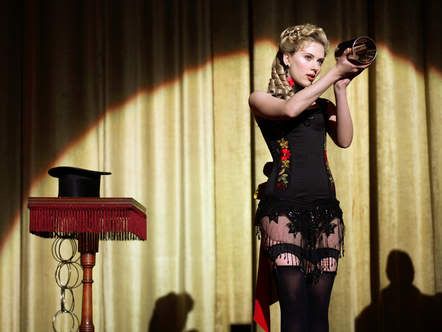 Olivia (Scarlett Johansson). She is first Angier's assistant; Angier sends her to spy on and sleep with Borden, and she switches sides in disgust. She's a good accomplice, particularly for Borden who she helps revolutionize his career. They fall in love, but she also becomes disgusted by his fickleness. Again, the twins can't be bothered to tell her the truth. Despite being traded like a pawn between the men, she has a fair amount of agency and independence. One could argue that she's a Whore, but given her sympathy for the dead Sarah and her decision to leave Borden, I think that she avoids that trap. Alive, good.
Olivia (Scarlett Johansson). She is first Angier's assistant; Angier sends her to spy on and sleep with Borden, and she switches sides in disgust. She's a good accomplice, particularly for Borden who she helps revolutionize his career. They fall in love, but she also becomes disgusted by his fickleness. Again, the twins can't be bothered to tell her the truth. Despite being traded like a pawn between the men, she has a fair amount of agency and independence. One could argue that she's a Whore, but given her sympathy for the dead Sarah and her decision to leave Borden, I think that she avoids that trap. Alive, good.
CONCLUSIONS: Two dead wives, twice the manpain. (Or well, triple, if you count the twins separately.) This story, too, was an adaptation; but, again, Nolan chose to take this project on. Something about dead wives really appeals to him. Sarah and Olivia do speak to each other once, but only so that Sarah can object to Olivia calling her husband "Freddie," so it's definitely about a man.
CASE STUDY: Inception, 2010
A team of extractors led by Dom Cobb (Leonardo Dicaprio) invades the mind of an energy magnate, but they're dogged by a shade from Cobb's past, Mal (Marion Cotillard).
The women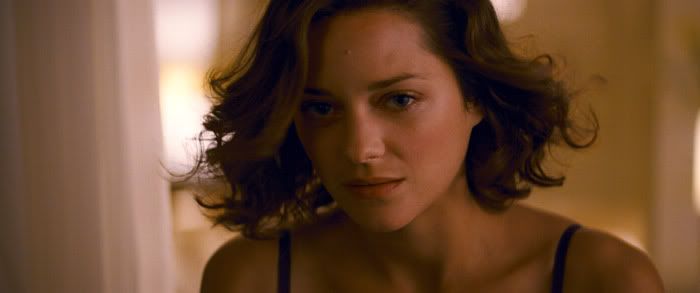 Mal. Let's get the obvious one out of the way: the dead wife. And not only is she dead, we actually see her die four times over, both in dreams and in real life. Twice are suicide, once she's shot by her husband, and once she's shot by the movie's other woman. Her madness and eventual real-life suicide were her husband's fault. After her death she haunts his subconscious and is the film's femme fatale and villain. Plus, most of the time she's she's not even real. Besides the few flashbacks where she's crazy and suicidal, she spends most of the movie as a goddamn projection of Cobb's memory of her, laced with his guilt and self-loathing. She has absolutely no autonomy of her own. It's like Chris Nolan's worst hits, all wrapped up in one admittedly-gorgeous Frenchwoman. Very dead, antagonist.
Mal. Let's get the obvious one out of the way: the dead wife. And not only is she dead, we actually see her die four times over, both in dreams and in real life. Twice are suicide, once she's shot by her husband, and once she's shot by the movie's other woman. Her madness and eventual real-life suicide were her husband's fault. After her death she haunts his subconscious and is the film's femme fatale and villain. Plus, most of the time she's she's not even real. Besides the few flashbacks where she's crazy and suicidal, she spends most of the movie as a goddamn projection of Cobb's memory of her, laced with his guilt and self-loathing. She has absolutely no autonomy of her own. It's like Chris Nolan's worst hits, all wrapped up in one admittedly-gorgeous Frenchwoman. Very dead, antagonist.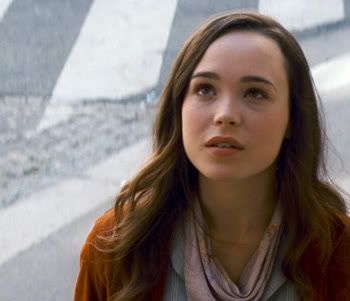 Ariadne (Ellen Page). Curiously, the film that has the worst representation of women also has the best female character that Nolan can offer to date. Ariadne is described as an ever better architect than Cobb was, she's the only teammember who calls him on his emotionally-disturbed shit, yet she is a constant support and guide for him. She's the supreme example of woman-as-conscience, persistently pushing Cobb to face his demons. Ultimately she's the one who completes the job they were hired to do, by shooting shade-Mal and literally drop-kicking Fischer out of Limbo. As the newest teammember, she's a stand-in for the audience, asking all the questions we're wondering; though Cobb is the main character, we're meant to identify with level-headed Ariadne. However, she is still a prop to Cobb's emotional and physical journey. We do see her "die" at one point, stabbed by Mal no less. On the scale of Christopher Nolan movies, she's pretty damn good, but he's still got a long way to go. Alive.
Ariadne (Ellen Page). Curiously, the film that has the worst representation of women also has the best female character that Nolan can offer to date. Ariadne is described as an ever better architect than Cobb was, she's the only teammember who calls him on his emotionally-disturbed shit, yet she is a constant support and guide for him. She's the supreme example of woman-as-conscience, persistently pushing Cobb to face his demons. Ultimately she's the one who completes the job they were hired to do, by shooting shade-Mal and literally drop-kicking Fischer out of Limbo. As the newest teammember, she's a stand-in for the audience, asking all the questions we're wondering; though Cobb is the main character, we're meant to identify with level-headed Ariadne. However, she is still a prop to Cobb's emotional and physical journey. We do see her "die" at one point, stabbed by Mal no less. On the scale of Christopher Nolan movies, she's pretty damn good, but he's still got a long way to go. Alive.
CONCLUSIONS: A decidedly mixed bag. The very best and worst, packed into one. It also comes closest to passing the Bechdel test: Ariadne and Mal talk, but Mal is technically a projection of Cobb's mind and their conversation was subtextually about Cobb. So it's debatable.
SUMMARY OF FINDINGS.
+ Going through the IMDB database, I counted up the number of named characters in the above movies. (Although as we've seen, "named" is a fairly relative term -- "Gordon's Daughter" and "Leonard's Wife," for example.) There were 94 names roles for all of Nolan's major films. (I'll confess I haven't seen Following or Doodlebug. If someone has, please chime in.) (ETA: Somebody did chime in! Ryan Meray reports: "In Following, the only woman in the film dies. Also fails the Bechdel test.") Even being generous with what constitutes a name, only 23 of those roles belonged to women.
+ Of those 23, only 17 had speaking roles (more than one line).
+ Of those 17, only 9 were alive at the end of the movie.
+ Of those 9, 5 were antagonists, Whores, or Madonnas.
+ That just leaves the hotel manager in Insomnia (who apparently has a name -- I was generous there), Rachel Dawes in Batman Begins, Olivia in The Prestige, and Ariadne in Inception. One of them dies in a later film, and one "dies" in a dream, one is almost a Whore, and one barely has a name.
+ Of the 6 women who are wives in Chris Nolan movies, only Barbara Gordon survives her movie. Of the other 5, 4 commit suicide.
+ Of the 8 women who die, 6 are inarguably cases of fridging. Remember, "fridging" means killing a woman off solely to give the main male hero a reason to angst. The two wives in Memento match this profile to a T, as do the two wives in The Prestige, Mal in Inception, and Rachel Dawes in The Dark Knight.
But fridging is obviously only part of a larger problem in Nolan's cinescape. Recent studies have shown that women get only about 30% of the speaking roles in films and tv shows, despite making up half the population. In Nolan movies, only 23% of the named roles are women. I haven't the wherewithal to examine the percentage of speaking roles that belong to women, but I'm guessing that it's not many.
Again, let me be clear that I am a fan of Nolan. I belive he's a visionary. But speaking as a woman who watches his movies, I find myself longing to see someone like me onscreen, who doesn't die horribly. I want to believe that he is better than this. I want to believe that he just hasn't been challenged on it yet.
Consider this your gauntlet, Mr. Nolan.
